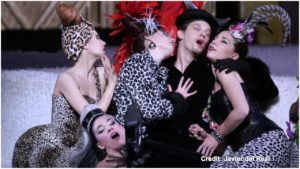
Teatro Real de Madrid 2018-19 Review: La Calisto
A Baroque Masterpiece Gets An Equally Vibrant Interpretation
By Mauricio VillaThere was a major success at Teatro Real with the presentation of Cavalli’s ”La Calisto” in its Madrid premiere. It is always a pleasure to discover a new opera, and with the baroque renaissance we are experiencing in recent decades, it wouldn’t surprise me if “La Calisto” became a regular in the repertoire.
“La Calisto” is a mythological tale where we find liaisons between gods and humans, men in drag and even homoerotic relationships like the one between Calisto and who she believes to be Diana, Jupiter in disguise. The music is fresh, spontaneous and suggestive; it is an astonishing masterpiece.
With a wonderful inspiring production by David Alden and a splendid cast led by Ivor Bolton in the pit, this performance of “La Calisto” will probably be the best event of Madrid’s season.
David Alden’s Masterful Vision
David Alden’s production premiered at the Bayerische Staatsoper in 2005 where it has been revived several times, including at the Royal Opera in London too. With original sets and costumes by Paul Steinberg and Buki Shiff, the opera is set in a 1970 brothel/nightclub which reminds us of the psychodelic universe of an Austin Powers movie. Clever use of the space with actors moving the sets around, a large staircase and a pit in the proscenium where the interpreters enter, exit and even jump into, helps enormously to recreate the frenzy action of the opera.
We see animal figures on stage which seem to have come out from a comicbook, like a cow wearing a leather jacket and drinking a milk tetra brick, or an amusing chameleon which crosses the stage during several moments with its languid pace. The costumes and choreography work (by Beate Vollack ) of the two peacocks which accompany the character of Giove were amazing. Everything was so imaginative and alive, the action just never stops. It is really an outstanding production.
Superb Leads
The cast was superb too, comprised mainly of young singers who specialize in the baroque repertoire. What we get are the characters on the stage and not the singers pretending to act.
The young Austrian baritone Wolfang Stefan Schwaiger was Giove. He has a warm lyrical voice full of nuances and details, sturdy Italian diction and tremendous stamina which amply managed the demands of Alden’s staging.
He was accompanied by the Spanish tenor Borja Quiza in the role of Mercurio. Quiza displayed a resonant and large voice with solid intonation throughout. They formed a kind of Wotan/Loge relationship during the opera.
The character of Calisto was entrusted to Anna Devin, who had been seen the past season in “Lucio Silla” at the Teatro Real. She has an exquisite, silvery voice, completely uniform in all the registers which she used to service the complex character of a woman who wants to die a virgin but who gives herself to the goddess Diana, gets pregnant, and is later transformed into a bear; she ultimately ends up being transfigured into the Ursa Major constellation by Giove.
Rachel Kelly performed the double role of L’eternita/Giunone with a dark, powerful voice and delicate vocal line.
Diana was Teresa Iervolino, who interpreted her role with a solid velvet voice, a ringing upper register and a sparkling coloratura.
Other Brilliant Cast Members
Xabier Sabata was the shepherd Endimione. This great Spanish countertenor had the most lyrical moments of the score, including the emotive aria “Lucidissima face,” which he delivered with his dark resonant voice, always full of emotion.
The veteran countertenor Dominique Visse played the double role of La Natura/Satirino. He knows the opera and the production quite well as he has already perform it in Munich and London. He have an exciting and vigorous performance full of details and energy. However, his voice seemed a bit dry and tired, unbalanced between registers and sometimes slightly off pitch. Despite that, he managed to surpass these perceived challenges by coloring each phrase with unlimited use of dynamics. He was simply brilliant.
Guy de Mey, who had sung the role of Linfea the previous night had to step in and reprised the performance because Francisco Vas was suffering a vocal affection. Another veteran of Alden’s production from Munich and London, de Mey displayed dignity and humor in drag character who even does a strip tease during his aria in the third act. Mey knows how to colored the vocal line and the use of unlimited expressive resources to fulfill the repetitions of the verses so typical in the baroque compositions.
Ivor Bolton, musical director of Teatro Real, conducted a critical edition of the score in a performance that also featured the Monteverdi Continuo Ensemble and the Orquesta Barroca de Sevilla. Being an expert of the baroque and classical repertory, the English conductor gave a powerful and energetic reading of the score, playing the bass continuo himself as he did in the performances of Mozart’s “Idomeneo.”
This was a consummate experience with vibrant direction and an incredible cast bringing this baroque classical to life.


